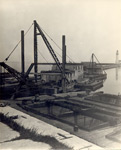Flouring Mills of Oswego
- Full Text
- Flour Mills of Oswego
The following named mills are all located on the Varick Canal, with the exception of the Pearl Mill, which is situated on the West side of the river about two miles from the city.
Pardee's (Oswego) Mill
This mill has six run of stone, and can manufacture 500 barrels of flour per day. It was not in operation during the greater part of last season. We have no means of knowing how much flour was manufactured at this mill last year. But the Mill has manufactured 68,000 bbls of flour in one season. It can store 25,000 bus of wheat and 4,500 bbls of flour. The elevator at this mill can elevate 1,500 bushels of wheat in an hour.
Ransom & Seeley's(Atlas) Mills
This mill can manufacture 500 bbls of flour in a day. It has five run of stone, and manufactured 38,000 bush of wheat and 3,000 bbls of flour—1,000 bus of gain can be elevated in an hour at this mill.
Mr. Stevens, (Star) Mill
The Star Mill has five run of stone and can manufacture 450 bbls of flour in a day. it made 40,000 bbls of flour in 1851. It can contain 20,000 bus of wheat and 2,500 bbls of flour. The elevator at this mill can elevate 1,200 bushels of grain an hour.
Mr. Beardsley (Premier) Mill
This mill has five run of stone and can manufacture 400 bbls of flour a day. The Premier Mill was not in operation during a great part of last season, but manufactured 25,000 bbls of four nevertheless 3,000 bus of wheat and 3,000 bbls of flour can be stored at this Mill. It can elevate 1,200bus of grain per hour.
W. Lewis Jr.'s (Exchange) Mill
The Exchange Mill has six run of stone. This is a Flouring and Custom Mill, and can manufacture 400 bbls of flour per day. In 1851 the Exchange Mill made 30,000 bbls of flour it can elevate 1,000 bus of grain per hour.
Whitney & Co. (Pearl) Mill
This mill has five run of stone and can manufacture 500 bbls of flour a day. In1851 though it was not in operation more than half the season, it made 30,000 bbls of flour. It has storage for 30,000 bus of grain and 2,500 bbls of flour It can elevate 1,30 bus of grain an hour.
Talcott & Canfield's (Magnolia) Mill
This mill had three run of stone, and can grind 275 bbls flour a day, elevates 1,100 bushels of wheat an hour stores 15,000 bus wheat and 2,000 bbls flour. This mill was built last summer, and had run but a few months.
H.C. Wright(Crescent) Mill
The Crescent Mill has four run of stone, and can manufacture 400 bbls of flour a day. This mill manufactured 32,000 bbs of flour in 1851. Can store 20,000 bus of wheat and 2000 bbs of flour. Elevates 1000 bushels of grain in an hour.
We have been unable to learn the exact amount of flour manufactured at Ulhorn & Bros. Mill or its capacity. This mill, however, is as capacious and powerful as any of the above.
The above includes all the mills on the West side. Many of them were not in operation during the entire season, and hence the small amount of flour manufactured by these mills last year. We should have stated the amount of flour manufactured at Fitzhugh & Co's mill to be 67,225 not 63,225 as we published yesterday.
- Media Type
- Newspaper
- Text
- Item Type
- Clippings
- Date of Publication
- 23 Mar 1852
- Subject(s)
- Collection
- Richard Palmer
- Language of Item
- English
- Geographic Coverage
-
-
New York, United States
Latitude: 43.45535 Longitude: -76.5105
-
- Creative Commons licence
 [more details]
[more details]- Copyright Statement
- Copyright status unknown. Responsibility for determining the copyright status and any use rests exclusively with the user.
- Contact
- Maritime History of the Great LakesEmail:walter@maritimehistoryofthegreatlakes.ca
Website:


